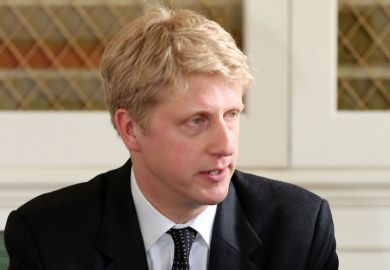Many taught postgraduate courses at UK universities could become unviable in the wake of the country’s exit from the European Union, sector leaders have warned.
Non-UK EU nationals represented 6.4 per cent of all full-time taught students at British universities last year, but they were particularly concentrated at master’s level, making up 11.6 per cent of this cohort.
Rosemary Deem, vice-principal (education) at Royal Holloway, University of London and chair of the UK Council for Graduate Education, said that there was now a “big risk” to taught postgraduate recruitment and that there was “no question” that the viability of some courses would be affected.
In the wake of Brexit, EU postgraduates would probably have to pay international student fees, which are significantly higher than the home rates they currently have access to, and would probably lose access to the master’s loans being introduced this September, Professor Deem said.
She suggested that the opportunity to study more cheaply on the Continent meant that the long-standing attraction of taking a one-year master’s in the UK rather than a two-year course elsewhere was likely to be eroded.
“Taught postgraduate courses were not the happiest area of recruitment for universities before this,” Professor Deem said. “The fact many students will not come in a number of years is going to make a huge difference: some of these programmes will just go.”
Higher Education Statistics Agency data show that some universities are particularly exposed to any significant decline in the number of these students: non-UK EU students made up more than one in five full-time students on taught postgraduate courses at 20 institutions last year.
They represented 29.8 per cent of full-time taught postgraduates at the University of St Andrews and 25.5 per cent at the London School of Economics, for example.
Certain subject areas are also likely to be disproportionately affected: EU nationals made up 20.3 per cent of all taught postgraduates studying law, with mathematical sciences (15.8 per cent), languages (14.6 per cent) and engineering (14.5 per cent) also at risk.
The impact could be even greater if the apparent rise in anti-immigrant sentiment following the referendum results in a further drop in non-EU international recruitment.
Graham Galbraith, vice-chancellor of the University of Portsmouth, called on sector leaders to make a positive case for EU students to retain preferential access to UK higher education.
“Already the overseas market is struggling and, if you add even a modest decline in EU students, you can see some quite difficult scenarios,” Professor Galbraith said. “My concern is that contraction in certain programmes will make them unviable, and that reduces the choice for UK students.”
The Student Loans Company has confirmed that current EU students and those starting courses later this year will continue to receive funding until the end of their course.
EU students are likely to retain their current fee status while the UK negotiates its exit, and university websites indicate that 10 universities have so far confirmed that EU fees will remain tied to home fee levels in 2017-18, as well as in 2016-17. Durham University and Goldsmiths, University of London have offered the same guarantee for 2018-19, while Coventry University and the University of Bedfordshire say that there will be no change for the next five years.
But it is unclear what access to loans future EU students would have to cover these fees once Brexit is complete.
Institutions with highest proportion of EU students on taught postgraduate courses, excluding providers with fewer than 1,000 taught postgraduates
| Institution | % |
| Cranfield University | 37.6 |
| Edinburgh Napier University | 30.0 |
| University of St Andrews | 29.8 |
| London School of Economics | 25.5 |
| Royal College of Art | 24.4 |
| Heriot-Watt University | 22.3 |
| Imperial College London | 21.6 |
| University of Cambridge | 21.3 |
| Soas, University of London | 20.1 |
| London Business School | 18.9 |
| University of Oxford | 18.9 |
| King’s College London | 18.2 |
| University of the Arts London | 18.1 |
| University of Kent | 17.7 |
| University of Edinburgh | 16.8 |
Source: Hesa data for 2014-15
POSTSCRIPT:
Print headline: Lower continental recruitment ‘could force master’s courses to close’
Register to continue
Why register?
- Registration is free and only takes a moment
- Once registered, you can read 3 articles a month
- Sign up for our newsletter
Subscribe
Or subscribe for unlimited access to:
- Unlimited access to news, views, insights & reviews
- Digital editions
- Digital access to THE’s university and college rankings analysis
Already registered or a current subscriber?










